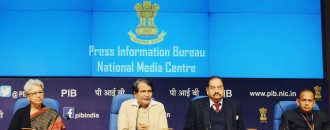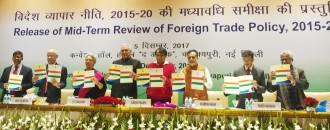
Top bureaucrats bat for the new Foreign Trade Policy
Neha Dewan | The Dollar Business  A day after the Foreign Trade Policy (FTP) was unveiled, Commerce Secretary Rajeev Kher and Director General of Foreign Trade (DGFT) Pravir Kumar addressed the industry and media at the National Seminar on Foreign Trade Policy organised by FICCI in the capital. Kher said the policy statement has laid down a framework to increase exports of goods and services and would help in boosting employment, as well as increasing value addition in the export basket. “The FTP statement for 2015-20 basically rests on five major planks. These include dovetailing trade policy with domestic policy; aligning it with the thrust on manufacturing and services; synchronising it with the ecosystems that are sought to be created for the country; an institutional framework that is inclusive in nature; and involvement of state governments as stakeholders in the bid to make India a competitive foreign trading nation,” Kher said. He also explained how the industry should respond to two emerging global developments – (a) global trading architecture undergoing a paradigm shift and (b) change in the institutional architecture for trading. The latter would need foreign trade stakeholders adopting to mega regional, as well as broader trade and economic partnerships. Similarly, reflecting on the FTP, Pravir Kumar said that simplification of processes and procedures and facilitating ease of business were central to the statement. “In times to come, subsidies will have to be phased out” he said, and added that duty credit scrips available to merchandise and service exports would now be fully transferable and could be used to pay customs duty, excise duty and service tax. Besides this, he also mentioned that there is going to be a big push for automation and digitalization of all aspects of trade. “Inter and intra department consultations and interactions will also be in the digital mode,” he added.
A day after the Foreign Trade Policy (FTP) was unveiled, Commerce Secretary Rajeev Kher and Director General of Foreign Trade (DGFT) Pravir Kumar addressed the industry and media at the National Seminar on Foreign Trade Policy organised by FICCI in the capital. Kher said the policy statement has laid down a framework to increase exports of goods and services and would help in boosting employment, as well as increasing value addition in the export basket. “The FTP statement for 2015-20 basically rests on five major planks. These include dovetailing trade policy with domestic policy; aligning it with the thrust on manufacturing and services; synchronising it with the ecosystems that are sought to be created for the country; an institutional framework that is inclusive in nature; and involvement of state governments as stakeholders in the bid to make India a competitive foreign trading nation,” Kher said. He also explained how the industry should respond to two emerging global developments – (a) global trading architecture undergoing a paradigm shift and (b) change in the institutional architecture for trading. The latter would need foreign trade stakeholders adopting to mega regional, as well as broader trade and economic partnerships. Similarly, reflecting on the FTP, Pravir Kumar said that simplification of processes and procedures and facilitating ease of business were central to the statement. “In times to come, subsidies will have to be phased out” he said, and added that duty credit scrips available to merchandise and service exports would now be fully transferable and could be used to pay customs duty, excise duty and service tax. Besides this, he also mentioned that there is going to be a big push for automation and digitalization of all aspects of trade. “Inter and intra department consultations and interactions will also be in the digital mode,” he added.
This article was published on April 2, 2015.



-Vertical.jpg)


 to success.
to success.